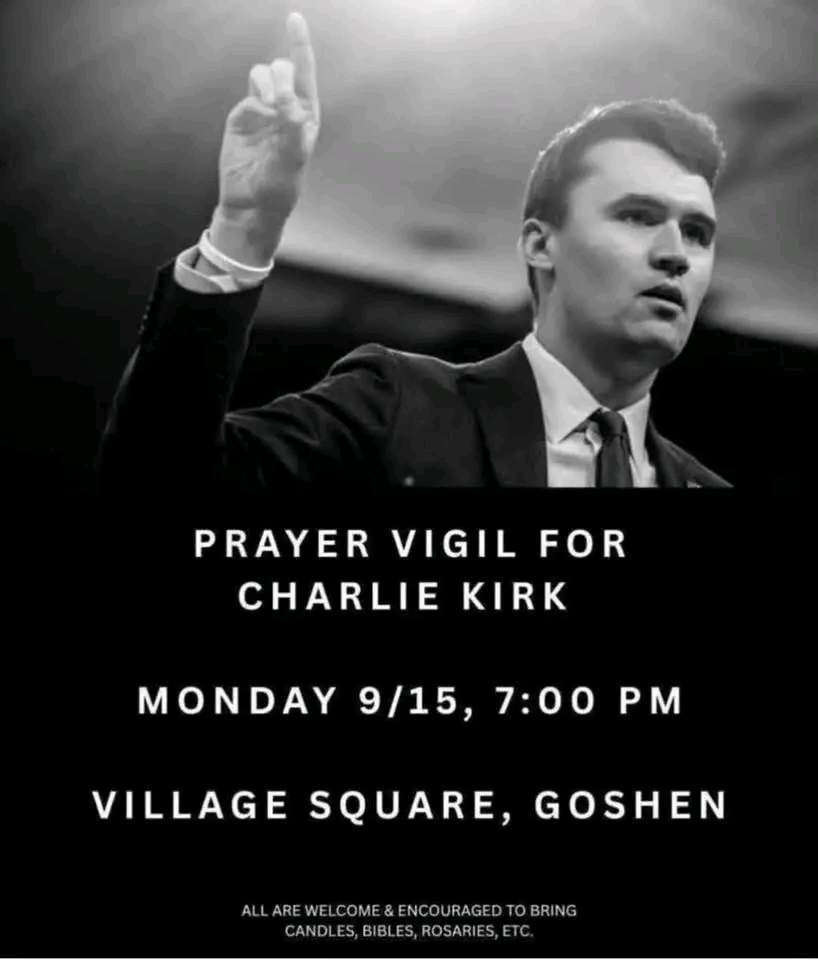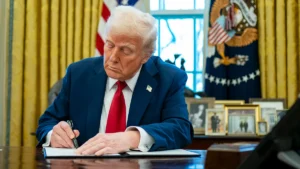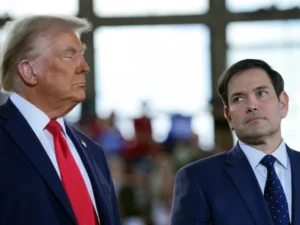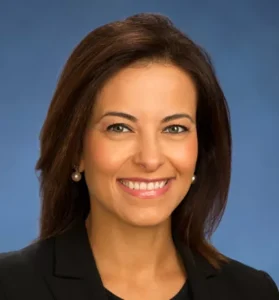By Ernest Francis
The Prayer Vigil on this past Sunday for Charlie Kirk, assassinated the preceding
Wednesday, was the end and the beginning. It was the end because it was a time for collective
grief yet at the same time an acknowledgment of what he had accomplished in his relatively short
life. It was also the beginning of the next chapter in the movement (embodied in his
organization, Turning Point) that he started, nourished, and saw become a powerful force in
American politics. The challenge now is who will pick up the microphone and continue
delivering the message.
The event itself was spectacular, as one would expect from the nation’s capitol. It was
organized in approximately 48 hours. The Kennedy Center hall was filled to its capacity of
thousands with people lining up hours before the event officially started.
The event featured a number of prayers as well as rousing contemporary music popular in
the Christian evangelical community. But the main event during the evening was the series of
seven speakers – prominent stars in contemporary conservatism – who described their
experiences with Charlie and paid tribute to him and his work.
The presentations by the prominent speakers outlined his many exceptional abilities and
character traits and suggested the numerous ways in which he could serve as an inspiration to
those who survive him. He was above all a man of profound faith who saw what he did as
service to God, especially in his efforts to have those who are lost find salvation in Jesus Christ.
He was a vigorous opponent of government overreach that infringed on the liberties guaranteed
to all Americans. He resisted the cultural decay that society seeks to impose as the norm. The
method by which he would win others to embrace his position was through discussion and
persuasion rather than coercion and violence. He approached his mission with tremendous
passion and seemed to have inexhaustible energy. He opened doors to the political process for
young conservatives whom the establishment was not making an effort to reach. He saw the
promise in others whom he recruited to become involved in politics. And he was a brilliant
strategist, whose efforts were critical in securing Donakd Trump’s return to office.
Mike Johnson
The first speaker was Mike Johnson, the Speaker of the United States House of
Representatives. He began by saying the ground had shifted with the assassination and that
Charlie Kirk offered more to the free marketplace of ideas than anyone of his generation But
Johnson emphasized two ways in which those who followed Charlie could continue to follow
him.
The first way is to advance his principles. Charlie knew what made America great and
strongly believed what is stated in the second paragraph of the Declaration of Independence. All
men are created equal, and man’s rights come from his Creator, not the state. This is an
especially important precept in light of recent comments by a Democrat Senator disputing what the Declaration says about the source of man’s rights. Another of Charlie’s beliefs was that
because humans are made in the image of God, everyone has inherent value.
Second, Charlie loved debate, but he loved people more. He reached out his hand to
those lost – not just intellectually but spiritually – in order to pull them back from the abyss.
Karoline Leavitt
The next speaker was Karoline Leavitt, the White House press Secretary, who began by
saying that God was in the room that evening. She credited Charlie Kirk with putting her in her
current role through winning the 2024 election for President Trump. She emphasized how
Charlie had brought many young people into the political process at a time when the old (preTrump) GOP establishment ignored them. Charlie had helped her when she became a candidate
for one of the Congressional seats in new Hampshire. He looked for outsiders who would
challenge the status quo, and he was maverick who resisted the brainwashing that society
attempts to impose. In contrast to the brainwashing, Charlie advocated faith, marriage and
children, and American exceptionalism. She noted that Charlie brought light into a world
consumed by darkness, and she called for others now to pick up the torch and rededication to
keeping America the greatest country.
Tulsi Gabbard
Also speaking was Tulsi Gabbard, Director of National Intelligence, and she started with
the question of how we spend the limited time that we have on earth. Every day Charlie carried
out his mission motivated by faith in Jesus Christ and his dedication to defending freedoms in the
Constitution and the Bill of Rights. Charlie was not there for praise.
Charlie engaged in lively debate, but he didn’t belittle, and he wanted a sincere dialogue
in which even those who disagreed with him could be heard. He would say if anyone disagreed
with him, then they should come to the front of the line to speak with him so that he could
respond to them. No matter how horrible a another person’s speech, Charlie believed in
defeating what was disagreeable through ideas and not by violence.
Martin Luther King stated that darkness could not drive out darkness, only light could do
so, and hate could not drive out hate, only love could do so. Charlie’s faith in God made him
choose love and to shine God’s light into the world. He would turn to God in good times and
hard times and he was far more interested in what God wanted from him than what he wanted
from God.
Charlie’s decision to proceed in love was what resulted in his murder. He exposed others
for who they are, with ideas that are hollow and empty. Those who act with anger and hate for
their opponents – in contrast to the way Charlie acted – are spiritually empty and without
contentment because they have rejected God in their efforts to make themselves God.
The assassination of Charlie and the 9/11 Islamist terrorist attack were perpetrated by those whose ideas cannot stand up to scrutiny. And therefore they attempt to terrorize others into
silence. Those attempts to bring silence through terrorism must be rejected.
Robert F. Kennedy, Jr.
Secretary of Health and Human Services Robert F. Kennedy, Jr., followed Tulsi Gabbard,
and spoke of the millions of young people who now want to live like Charlie Kirk. He identified
Charlie as the “architect of his endorsement of President Trump.”
He noted that the first time he met Charlie was doing a podcast, and he admitted to
having some trepidation before doing the podcast. Yet by the end of the podcast he and Charlie
had become friends. They both highly valued the First Amendment. A government that can
silence its opponents can commit any atrocity it wants. They also spoke about the violation of
constitutional rights during the pandemic, once the government knew that the public would
accept censorship. Charlie was a prominent voice in the resistance to those constitutional
violations and built his movement so that they will not happen again.
When someone has died, we can take the best virtues and character traits of that person
and integrate them into our own character, and that person will live on in us. Charlie had many
virtues, including reaching out to those who are asleep spiritually and protecting them until they
wake up.
Charlie asked RFK if he was scared of dying, and his response was that there are things
even worse than dying, including losing one’s rights so that one’s children live in slavery.
Sometimes the only consolation then is that one has died fighting, “with one’s boots on.” Charlie
gave his life so that others need not suffer, and now the battle that he fought must be won for
God, country, and our families.
Kari Lake
The fifth speaker, Kari Lake, the acting CEO of the US Agency for Global Media since
July, 2025, started by observing that God had filled up kennedy center. She noted that the Right
was not perfect, but most of the violence that has affected American politics has come from the
Left, and it has to stop.
She spoke of the present malignant influence of American colleges and universities
generally and in connection with the murder of Charlie Kirk in particular. She asked how a 22
year old woud be so full of hate that he would kill someone. Her answer was that he was sent to
college, where he was indoctrinated. The function of colleges and universities is brainwashing –
“the most horrific brainwashing campaign in history of mankind.”
In response she called for resistance to it. Children’s minds and futures cannot be
negotiable. One way to avoid the brainwashing of college is simply not to have one’s children
attend college. Charlie Kirk never went to college, and Kari Lake’s daughter did not attend
college. They are none the worse for not having that experience.
Lake spoke about the time she had dinner with Charlie and his wife Erika on the day that
Trump endorsed her. She asked him “what’s the next step.” What followed was a two and a half
hour discussion in which he outlined strategy for her. At the end of the meeting, he said you
have a new name. “Your first name is now ‘Trump endorsed’, and your second name is now
‘Kari Lake.’”
She concluded by noting that Charlie would be bigger after his death than he was in life.
Those who want to continue what he started would need courage – “step up, be strong” she said –
because the Left’s effort to combat what Charlie started was only going to get worse. The Left’s
campaign against those in the movement would include cancellation, loss of friends or
employment, lawfare, depositions, and subpoenas.
Finally, she observed that Charlie would be remembered most for bringing people to God.
She pointed to increased church attendance in the wake of his assassination.
Ana Paulina Luna
Kari Lake was followed by Congresswoman Ana Paulina Luna of Florida. She observed
that Charlie Kirk was a patriot in every sense of the word. But he didn’t just complain; he did
something.
He engaged young people in the conservative movement at a time when they were being
ignored by the Republican establishment. Turning Point channeled the energy of young people
by encouraging them to take a stand, and the movement grew from events with a few hundred
attendees to conferences with thousands.
Luna used her own life story as an example. She first met Charlie at a Turning Point
conference. After that, she received a call from Fox News asking to interview her on the issue of
immigration. Fox contacted her as a result of Charlie’s suggestion to Fox to interview her. This
showed Charlie’s ability to see in people what they did not see in themselves.
Later, she was literally packing to go to med school when Charlie called her and asked if
she wanted to be the National Hispanic Outreach Director at Turning Point. She then decided
that the position he offered was the career path that God intended. When she went to the Turning
Point national headquarters she was surprised at how young people ran the entire operation.
She went with Charlie to “table” events on college campuses – so-called because Charlie
would sit at a table debating those who had contrary viewpoints. This was how he built a
movement – one conversation at a a time. What she saw at those events was the ability of Charlie
to defeat those opposing him through responses that were “cool, calm, and logical.” She noted
that “Charlie didn’t need college; college needed Charlie Kirk.”
She observed that Charlie had seemingly inexhaustible energy with an unrivaled work
ethic. He would be on a plane every day to a new city, it seemed – all while managing Turning point, raising funds, and engaging on social media and with news outlets. Yet at each table event, he was focused on the discussion.
Charlie encouraged her to share her story to combat the identity politics that the Left
emphasizes. He showed her how to use social media, respond to false narratives, and win
arguments with the truth. For him, truth was the best advantage one has in debate.
She noted how Charlie had helped her when she entered politics. He backed her in her
Congressional campaign and provided people to knock on doors for her and invited her on his
podcast. He did so without the expectation of anything in return. He provided advice to her and
to other members of Congress. In connection with the fight to elect a Speaker of the House in
2023, after her election in 2022, he advised her to “know when to take the deal.” She found his
advice was “strategic, brilliant, and trusted.”
She concluded her remarks by staing that Charlie’s place in history would be alongside
other historically transformative figures. History will record him as one of the greatest political
minds and activists. His legacy is his movement, and what she advocated was for fellow patriots
to share their stories, “get involved, join the movement, help others, run for office, but above all
keep debate alive and pray for truth to prevail.”
Andy Biggs
The final speaker of the evening was Congressman Andy Biggs of Arizona, who
described his reaction upon first meeting Charlie Kirk as “behold the man.” Charlie was a
crucial part of two great movements in the 21st century – MAGA and Turning Point.
Biggs noted that, as described by Solzhenitsyn, those in Russia during communism felt
that Russia had fallen to the communists because it turned its back on God. That serves as a
reminder that evil is real and a warning of what happens when a nation turns its back on God.
Jesus Christ, however, can restore a nation, and this national restoration was Charlie’s mission.
Each person is an eternal being but also leaves footprints or a track in this life. Now the
mission for those who believe as Charlie did is to take his movement – his track – and expand it.
We need to be like Charlie – eloquent and patient but firm and convicted in principles. The
mission going forward is to preserve freedom – including that of speech and worship – but also to
acknowledge our relationship to God and the status of Jesus Christ as savior and the only way to
God.
The evening finished with more songs and the lighting of the electronic candles that had
been distributed to he audience before the event started. It was a moving symbol of the
continuation of Charlie’s mission of national revival.















